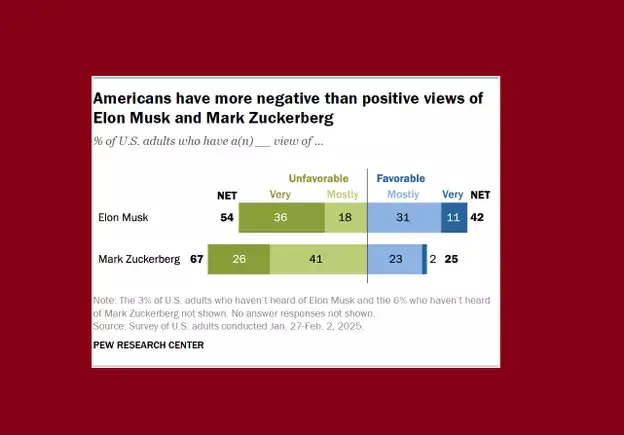Recent data from a Pew Research survey has revealed a striking shift in American public opinion towards two of the most influential figures in the tech industry: Elon Musk and Mark Zuckerberg. As the survey indicates, both individuals are experiencing a noticeable decline in their favorability ratings among U.S. adults. The statistics paint a vivid picture of this sentiment—54% of Americans hold an unfavorable view of Musk, with a significant portion (36%) expressing a particularly strong aversion towards him. In contrast, the situation is even more dire for Zuckerberg, who finds that approximately two-thirds of the population view him unfavorably, while only a meager 2% consider him very favorable.
This deterioration of public perception is not entirely unexpected. With both Musk and Zuckerberg consistently at the center of various controversies, their reputations have taken a hit. Musk’s political entanglements and controversial social media conduct have alienated many, while Zuckerberg’s actions in managing Facebook and its related platforms are perceived as exploitative by a considerable number of people. As these tech leaders continue to wield significant influence over societal discourse, it’s crucial to unpack the reasons behind their declining favorability and the implications of such trends.
One cannot ignore the high-stakes game that both Musk and Zuckerberg are playing. Musk, the owner of X (formerly Twitter), has transitioned from the role of an innovative entrepreneur to a polarizing figure who has frequently expressed controversial opinions on a range of topics. His vocal and often incendiary remarks, particularly regarding political subjects, have further alienated groups that may have previously admired his entrepreneurial spirit. His publicized family conflicts, evident in his strained relationship with his daughter, and his legal skirmishes further compound this negative perception. The public tends to associate Musk’s billionaire status with a lack of accountability, a sentiment that is explicitly reflected in the survey data.
Conversely, Zuckerberg’s image suffers largely due to persistent allegations about how he has managed his platforms. Accusations of mishandling user data and promoting algorithms that can detrimentally affect teenagers have sparked outrage. The local uproar surrounding his land purchases in Hawaii illustrates how his pursuits for business expansion often conflict with community welfare. Such actions contribute to the perception of Zuckerberg as out-of-touch with reality and indifferent to the consequences of his corporate maneuvers.
In today’s society, there seems to be an increasing expectation for corporate leaders to act with a greater sense of social responsibility. As tech moguls, Musk and Zuckerberg have arguably failed to respond to these expectations adequately. Both have resisted regulatory measures that seek to enforce checks and balances on their operations, which are seen as impeding their entrepreneurial pursuits. While they may have grounds for believing that regulations stifle innovation, it is essential to recognize that these regulations exist to cultivate an environment that safeguards societal interests.
The question that looms large is whether the diminishing favorability ratings of these billionaires will prompt any changes in their behavior or approach. Historically, billionaires have demonstrated a propensity to prioritize personal ambition and profit over public opinion. As they navigate their respective paths, they must heed the growing discontent among the populace or risk further erosion of their public personas.
The Future of Influence
The trajectory that Musk and Zuckerberg are on raises pertinent questions about their legacies. Will they ultimately be remembered as pioneering visionaries who changed the world, or will they be vilified for their perceived irresponsibility and ethical lapses? The landscape of public opinion is ever-shifting, and the current trend points towards a more cautious and critical evaluation of the methods and motivations of these tech titans.
As the influence of billionaires continues to expand, it becomes essential for society to maintain an oversight mechanism to mitigate potential harms caused by unchecked corporate power. The narrative surrounding Musk and Zuckerberg serves as a poignant reminder of the need for accountability within the corridors of tech ventures. Whether or not the public sentiment against these men will lead to tangible changes within their companies remains to be seen. However, the ongoing dissatisfaction reflects a broader conversation on the roles and responsibilities of business leaders in shaping a more equitable society.


Leave a Reply